

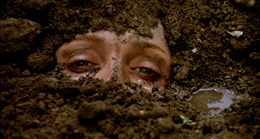 Since the early days of film, the mysterious outsider infiltrating a bourgeois family has been a reliable source for
Since the early days of film, the mysterious outsider infiltrating a bourgeois family has been a reliable source for 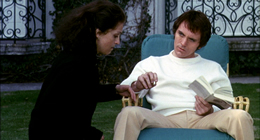 drama and/or amusement, ranging from the French classic Boudou Saved from Drowning to countless screwball comedies. Leave it to Pier Paolo Pasolini to put a sexual and religious spin on the idea with Teorema (original title: Teorema), one of the archetypal '60s art films. Like such fellow head scratchers as Blow-Up and Last Year at Marienbad, the film is primarily an allegory filled with symbols intended to resonate differently with each viewer, spiced up with enough controversial content to pull in the masses at the box office as well. A pivotal turning point in the director's career between his gritty early classics and his outrageous later work, Theorem is well worth viewing for anyone who doesn't mind filling in more than a few blanks at the end.
drama and/or amusement, ranging from the French classic Boudou Saved from Drowning to countless screwball comedies. Leave it to Pier Paolo Pasolini to put a sexual and religious spin on the idea with Teorema (original title: Teorema), one of the archetypal '60s art films. Like such fellow head scratchers as Blow-Up and Last Year at Marienbad, the film is primarily an allegory filled with symbols intended to resonate differently with each viewer, spiced up with enough controversial content to pull in the masses at the box office as well. A pivotal turning point in the director's career between his gritty early classics and his outrageous later work, Theorem is well worth viewing for anyone who doesn't mind filling in more than a few blanks at the end.
A charismatic stranger (Stamp) arrives during a party at a typical bourgeois house populated by a factory manager father (Baron Blood's Girotti), an elegant and aloof mother (Death in Venice's Mangano), a daughter (Wiazemsky), a son (Soublette), and a homely maid (Hatchet for the Honeymoon's Betti). The stranger and the son share a room, but one by one the newcomer finds a way to psychologically and/or physically seduce everyone around him. Igniting spiritual needs as well as sexual ones, he abruptly disappears and leaves his conquests to deal with the aftermath in their own fashion. Needless to say, some of them adapt far better than others as divine influence and madness come into view.
Slow, formally composed, and filled with enough 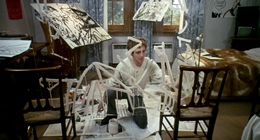 mystery to allow a multitude of interpretations, Theorem concerns itself with transformative power, be it through God, sex, or the act of watching cinema itself. Pasolini contrasts sepia-toned and color footage, windswept wilderness with the developing city, low class peasants with empty middle-to-upper class
mystery to allow a multitude of interpretations, Theorem concerns itself with transformative power, be it through God, sex, or the act of watching cinema itself. Pasolini contrasts sepia-toned and color footage, windswept wilderness with the developing city, low class peasants with empty middle-to-upper class 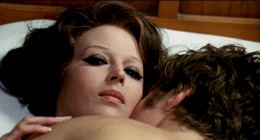 members; the camera lingers on the actors' bodies in a detached but strangely erotic fashion, though Mangano's sexual awakening turns ugly in the final act. Groundbreaking at the time for its politics, expressionistic acting, and surprising flashes of nudity, it became an international favorite of the critical and coffee house set, emerging as one of Pasolini's most widely discussed titles
until his more outrageous final four films in the 1970s.
members; the camera lingers on the actors' bodies in a detached but strangely erotic fashion, though Mangano's sexual awakening turns ugly in the final act. Groundbreaking at the time for its politics, expressionistic acting, and surprising flashes of nudity, it became an international favorite of the critical and coffee house set, emerging as one of Pasolini's most widely discussed titles
until his more outrageous final four films in the 1970s.
Like many Italian films of its era and onward, Theorem was shot with an international cast and dubbed in every territory in which it was released. Most viewers got an Italian language version with subtitles in their own native language, but the first DVD release from Italy (not anamorphic) contained both the Italian audio (no English subtitle options) as well as the far more obscure English dubbed track. Surprisingly, the latter is by far the more satisfying of the two; the dialogue is recorded and mixed more naturally, and the English track features a much more prominent and engaging use of the wild Ennio Morricone score including some catchy pop music and peculiar atmospheric compositions (along with a few dollops of Mozart). Though the film only contains a few minutes of dialogue during its running time, the presence of Stamp's real voice on the English version is quite welcome and makes this, along with a few other exceptions like Fellini Satyricon and Fitzcarraldo, that rare "foreign language" film whose English track provides a solid argument against the "native language with subtitles" argument. A French DVD followed in a far less colorful and satisfying transfer in Italian with French subtitles. Extras on both are mainly text-based, though the Italian disc does contain newly created trailers for a handful of the company's other art house favorites such as Belle de Jour and Throne of Blood. An anamorphic American DVD followed in 2005 from Koch Lorber and went out of circulation a few years later; it only contains the Italian audio with optional English subtitles, as well as a fairly rambling 52-minute featurette, "Pasolini and Death: A Purely Intellectual Thriller" (with weird overdubbing that makes it almost impossible to sit through).
 A 2007 UK release from the BFI improved things with a strong transfer and two excellent extras, an audio commentary by
A 2007 UK release from the BFI improved things with a strong transfer and two excellent extras, an audio commentary by 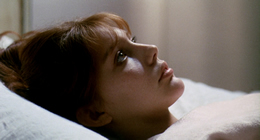 Robert Gordon (who takes an academic approach to the film and breaks down Pasolini's commentary in each scene on factors like politics, social class, and sexuality), while Stamp appears for a fascinating interview running just under half an hour. He actually starts off talking about how he got to Italy and wound up being cast by Federico Fellini in the "Toby Dammit" segment of Spirits of the Dead, which is a terrific story all by itself, and then goes into depth about Theorem (which he was anxious to appear in because of Mangano) and Pasolini. Both extras are carried over to the 2013 dual-format BFI release, which contains a Blu-Ray complete with a terrific HD upgrade following a theatrical UK reissue of the film. It looks fantastic, not surprisingly, and ranks with the other superb Pasolini Blu-Rays out there on the market. Colors look terrific, while the detail vaults way past the prior DVD editions. The Italian and English audio tracks are included together with optional subtitles for the first time on the same release, which would make this a keeper all by itself; the Blu-Ray contains the commentary and the 2013 reissue trailer, while the DVD contains the same elements along with the standard def Stamp interview. The illustrated booklet also contains bios for Stamp and Pasolini as well as a pair of insightful essays by Geoffrey Nowell-Smith and Philip Strick, including notes on the film's artistic influences and a fascinating reading of the trajectory of Girotti's character. A major world cinema release, highly recommended.
Robert Gordon (who takes an academic approach to the film and breaks down Pasolini's commentary in each scene on factors like politics, social class, and sexuality), while Stamp appears for a fascinating interview running just under half an hour. He actually starts off talking about how he got to Italy and wound up being cast by Federico Fellini in the "Toby Dammit" segment of Spirits of the Dead, which is a terrific story all by itself, and then goes into depth about Theorem (which he was anxious to appear in because of Mangano) and Pasolini. Both extras are carried over to the 2013 dual-format BFI release, which contains a Blu-Ray complete with a terrific HD upgrade following a theatrical UK reissue of the film. It looks fantastic, not surprisingly, and ranks with the other superb Pasolini Blu-Rays out there on the market. Colors look terrific, while the detail vaults way past the prior DVD editions. The Italian and English audio tracks are included together with optional subtitles for the first time on the same release, which would make this a keeper all by itself; the Blu-Ray contains the commentary and the 2013 reissue trailer, while the DVD contains the same elements along with the standard def Stamp interview. The illustrated booklet also contains bios for Stamp and Pasolini as well as a pair of insightful essays by Geoffrey Nowell-Smith and Philip Strick, including notes on the film's artistic influences and a fascinating reading of the trajectory of Girotti's character. A major world cinema release, highly recommended.
![]()